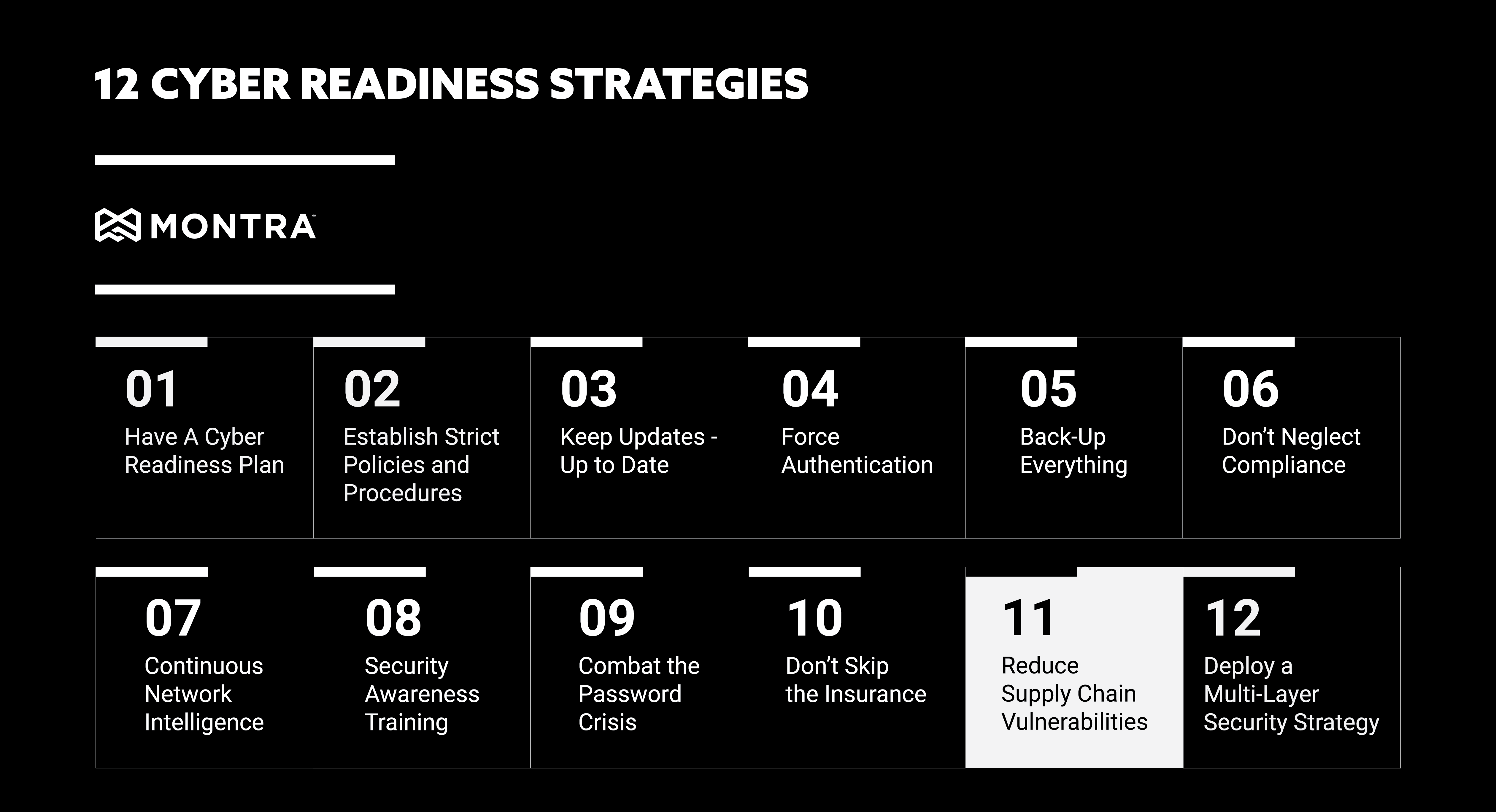Nearly two-thirds of firms (65%) have experienced cyber-related issues in their supply chain in the past year. As a part of your cyber readiness plan, you must deploy protocols to evaluate and monitor the security of your supplier networks and third-party vendors.
The supply chain is only as strong as its weakest link, and with the increasing complexity of global supply chains, that weak link is becoming increasingly difficult to find and fix. Cybersecurity threats can come from anywhere in the world, and they can have a devastating impact on businesses of all sizes. That’s why it’s so important to include reducing supply chain vulnerabilities into your cyber-readiness plan. By taking steps to secure your supply chain, you can help protect your business from the devastating effects of a cyberattack.

Here are 7 ways to reduce your supply chain cybersecurity vulnerabilities:
1. Understand Your Supply Chain
To reduce supply chain cybersecurity vulnerabilities, it is important to first understand your supply chain fully. By understanding the different components of your supply chain, you can better identify potential cyber risks and take steps to mitigate them. Make sure to conduct a thorough analysis of your supply chain including all your upstream and downstream partners, so that you can identify any potential weak points throughout the chain.
2. Train Your Employees
This first place to start reducing your supply chain cybersecurity vulnerabilities is to train your employees. Employees should be trained on how to identify potential risks and how to mitigate them. They should also be aware of the different security controls that you have in place. By educating your employees, you can help reduce the risk of supply chain disruptions and keep your business running smoothly. If you are not comfortable doing this in-house, look for a third-party that has expertise in cyber-security training especially with supply chain in mind.
3. Educate Your Suppliers
Another important step in reducing supply chain cybersecurity vulnerabilities is to educate your suppliers. Suppliers should be made aware of the different security controls that you have in place. They should also be trained on how to identify potential risks and how to mitigate them. You should look at cyber-security standards like NIST 800-161 and ISO 28000:2022, so that you have a common language and set of standards to use in your discussions with your suppliers.
By educating your suppliers, you can help reduce the risk of supply chain disruptions and keep your business running smoothly.
4. Conduct Risk Assessments
Another important step in reducing supply chain cybersecurity vulnerabilities is to conduct risk assessments. By identifying potential risks, you can take steps to mitigate them. Risk assessments should be conducted on a regular basis – usually annually or semi-annually – so that you can keep up-to-date on the latest threats even as your supply chain changes. Risk assessments can be conducted with in-house personnel, but third-parties are often used to make certain that ‘new eyes’ a looking at the supply chain systems periodically.
5. Implement Security Controls
Once you have identified potential risks, you can then take steps to mitigate them by implementing security controls. There are a variety of different security controls that you can implement, depending on the specific needs of your organization’s supply chain.
For instance, if you are moving computers or other smart devices through your supply chain, you need to take into consideration the patching and updating of those systems if they have been sitting in inventory for a long time. You should also consider the proper handling of those systems if they are returned for repairs. The systems should be air-locked until it is determined that they are not a risk to your organization.
6. Have an Incident Response Plan
In the event of a supply chain disruption, it is important to have an incident response plan in place. This plan should include steps that you will take to mitigate the impact of the disruption. It should also include a list of contacts that you will need to contact in the event of a disruption. A complete Incident Response Plan will cover all aspects of your operation, not just your supply chain, but the supply chain has historically been left out of security planning. As modern supply chains become heavily digitized and as the items in the supply chain increasingly have software components to them, the Incident Response Plan needs to take the supply chain into account.
7. Use a Cyber-aware Third Party Logistics Provider
If you are not sure how to reduce supply chain cybersecurity vulnerabilities, you may want to consider getting help from a third party logistics provider. A third party logistics provider can help you with a variety of different aspects of your supply chain. They can help you conduct risk assessments, implement security controls, and train your employees. By getting help from a third party logistics provider, you can effectively reduce supply chain cybersecurity vulnerabilities.
Now that you know more about how to reduce supply chain cybersecurity vulnerabilities, you can take steps to protect your business. By taking these steps, you can help reduce the impact of a supply chain disruption and keep your business running smoothly. Cybersecurity is an important issue in the supply chain that should be given the attention it needs. By taking a proactive approach, you can help reduce the risk of supply chain disruptions and keep your business running smoothly.
If you are not sure how to start assessing or remediating your supply chain cybersecurity vulnerabilities, you may want to consider getting help from a security-aware third party logistics provider. By working with a third-party logistics provider that has strong cyber-security skills, you can have confidence that you can effectively reduce your supply chain cybersecurity vulnerabilities.
If you have any questions or would like more information about reducing supply chain cybersecurity vulnerabilities, please contact us. We would be happy to help you protect your business from the many threats that exist in today’s digitized supply chain. If you would like more information or have questions about how strong your cyber-readiness is, please contact Montra at sales@montra.io.



